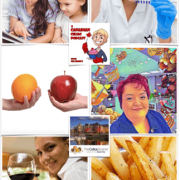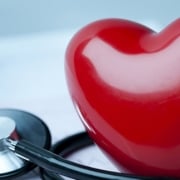Celiacs Who Date Report Anxiety and Admit to Taking Risks When Dining Out
 Most people living with celiac disease feel it significantly affects their romantic lives, according to the results of a recent online survey.
Most people living with celiac disease feel it significantly affects their romantic lives, according to the results of a recent online survey.
- Adam Leitenberger, gastroendonews.com 1
The findings show dating can compromise quality of life and adherence to treatment, said Jessica Lebovits, RD, of the Celiac Disease Center at Columbia University Irving Medical Center, in New York City, who called on health care providers to counsel patients about these issues.
The pressures of balancing adherence to a gluten-free diet while pursuing a romantic relationship may pose unique challenges and result in increased levels of social anxiety, decreased quality of life, and less adaptive eating attitudes and behaviors,” said Ms. Lebovits, who presented the results of the survey at the 2021 virtual Digestive Disease Week (abstract 246).
- “Dating poses an additional obstacle to compliance with the gluten-free diet and should be considered in the management of celiac disease.”
Lifelong adherence to a gluten-free diet—the only effective treatment for celiac disease—has well-documented adverse effects on quality of life, including studies that have shown:
- 81% of celiac patients stopped dining out after their diagnosis;
- higher adherence to a gluten-free diet correlates with lower quality of life in adults; and
- following a gluten-free diet can make people feel isolated, think constantly about food and worry about food safety.
But celiac disease’s specific effects on dating had not been previously investigated, study co-author Benjamin Lebwohl, MD, MS, the director of clinical research at the Celiac Disease Center at Columbia University, told Gastroenterology & Endoscopy News.
- “Based on our interactions with patients, we had suspected that celiac disease and the gluten-free diet has an effect on dating, but this study gave us a quantitative estimate that shows that it is substantial,” Dr. Lebwohl said.
More than 13,000 patients at Columbia’s celiac center were invited to complete an online survey that asked disease-specific questions about dating and used validated scales to assess social anxiety, quality of life and eating behavior.
In total, 538 adults who reported they had biopsy-proven celiac disease and followed a gluten-free diet completed the survey, and 644 partially completed it. Most were women (87%) between the ages of 23 and 35 years (24%) or older than 65 years (15%).
Of the 44% of respondents who had dated at some point after their diagnosis, more than two-thirds reported their disease had a major or moderate effect on their dating experience. Compared with those who said celiac disease had no effect on dating, this group was more likely to:
- be more hesitant to go on dates because of their disease (63% vs. 16%; P<0.001);
- have lower quality-of-life scores (60.3 vs. 77.7; P=0.015); and
- have lower household income (<$50,000 per year; 26% vs. 13%; P=0.019).
- People with lower incomes may find dating to be more challenging because restaurants that have extensive gluten-free options tend to be more expensive, Dr. Lebwohl noted.
While on dates, 39% of respondents indicated they felt uncomfortable explaining their dietary needs to servers, 28% took risks while dining out, and 8% reported they intentionally ate foods containing gluten despite the health risks of doing so. About 19% indicated they did not enjoy dating overall, especially those who:
- brought their own food on dates (40% vs. 14% who did enjoy dating; P<0.001);
- owned a Nima gluten sensor (42% vs. 17%; P=0.016);
- felt uncomfortable explaining their dietary needs in front of their companion (28% vs. 12%; P=0.003); and
- took risks while eating certain foods (30% vs. 14%; P=0.009).
Although women were overrepresented in the sample, they were more likely than men to report that celiac disease had a major or moderate effect on their dating experience (69.3% vs. 53.4%; P<0.001), possibly because women were more likely to mention their disease or the need to avoid gluten, Dr. Lebwohl said. In contrast, men were more likely than women to intentionally eat gluten on dates (13.2% vs. 6.5%) or engage in risky eating (34.2% vs. 27.1%), the survey found.
Of note, 39% feared that kissing could expose them to gluten, especially women (45.2% vs. 13.9%; P<0.001). About 22.7% reported their symptoms interfered with physical intimacy—again, especially women (24.5% vs. 10.7%; P=0.12).
Dr. Lebwohl said the risk for exposure to gluten from kissing is unclear and should be studied to help guide patient behavior.
- “What strikes me is that this theoretical possibility has translated into high rates of concern,” he said. “This speaks to the need to study and quantify risks, since it is possible that this concern is unwarranted.”
Amy Ratner, the director of scientific affairs at the awareness group Beyond Celiac, said discussions among her organization’s members show these findings are just a few of the concerns confronting the celiac disease community:
- “People with celiac disease might think they’ll have fewer choices in a partner or that they might never find one who understands,” Ms. Ratner told Gastroenterology & Endoscopy News.
- “Many may put their health at risk because they like someone so much that they don’t follow the gluten-free diet when they’re with them.
- And anxiety and depression can, in and of themselves, be symptoms of celiac disease, and these could influence how people feel about how a relationship is going.”
The researchers concluded that it is critical for health care providers to recognize these issues and discuss them with their celiac patients.
- “Given the degree to which a celiac disease diagnosis can impact dating, it is important to bring this up with patients, particularly during the dietitian’s assessment,” Dr. Lebwohl said. “This may be an area in which quality of life is impaired substantially, and so there are opportunities to develop strategies for mitigating the ways in which celiac disease and the gluten-free diet can affect the dating experience. If it is not discussed, it cannot be improved.”
1 https://www.gastroendonews.com/In-the-News/Article/10-21/Dating-With-Celiac-Disease/64805













